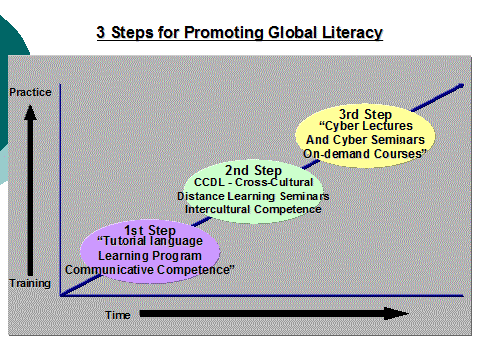ICT-based English Language Education toward creating Asian-Pacific Intelligence
Michiko Nakano
Waseda University
Waseda University has developed the three-stage English Language Education since 1997, shown in the following diagram:

In the first step, by reviewing and stabilizing what they have learned in high schools, their passive knowledge relating to communicative competence is turned into active knowledge so that they can develop oral communicative competence. This first stage adopts a hybrid method of ICT-based instruction, automatic scoring with face-to-face training of oral English. In order to reduce a learner's speech anxiety, one tutor teaches only four students. 100000 students enroll this English Tutorial Course every year. In the second step, our students are engaged in Cross-Cultural Distance Learning: theme-based interactive courses. Currently we have three broad categories: Global & Social Issues, Media Issues and International Career Path. The discussion topics include Climate Change, Unemployment Rate, Globalization, Entrepreneurs, Gender Issues, Advertisement, Country Images, etc. At this stage, we instruct transferable skills: Critical thinking, research methods, Grice's maxims, Politeness strategies, and Presentation skills. The third stage adopts multi-point cyber sessions among 9 universities in Asia; we deal with World Englishes,, Co-existence in Asia, Free Trade Agreements, etc. Our education at the third stage focuses on the development of cross-cultural competence, since our students should be able to discuss competently the current problems in the world with their oversea partners whose worldviews are incommensurable. We believe that multi-point distance learning offer opportunities for turning a learner's point of view into trans-cultural ones which may be termed as Global Literacy Education with Cross-Cultural Competence. This paper describes our educational efforts in Asia to encourage our students to adopt flexible and strategic multiple points of views to overcome incommensurable world views.
Michiko Nakano
BA and MA in English Literature, Tsuda College
MSc and Ph.D, Department of Linguistics, Faculty of Arts, Edinburgh University
Research Experiences: Centre for Cognitive Science, Edinburgh University and Center for Studies of Language and Information (CSLI), Stanford University
Director, Japanese Association of College Teachers (JACET)
Technology Director, Asia TEFL and Editor
Co-Chairperson, Pan-Pacific Association of Applied Linguistics (PAAL)
Consultant, Japanese Institute of Educational Measurement
Director, Digital Campus Consortium (DCC)
Director, Forum for On-demand Lecture Circulation (FOLC)


